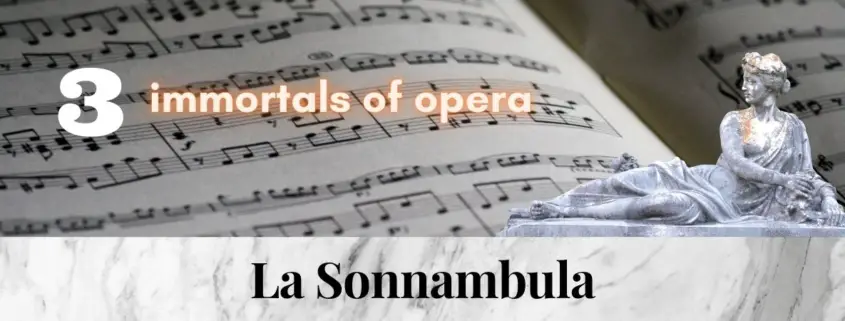With ” La sonnambula” Bellini created his first great masterpiece. The singers Battista Rubini and Giuditta Pasta made this opera immortal. 120 years later, Maria Callas sparked a renaissance of this work that continues to this day. A few months later Bellini wrote the greatest success of his career with “Norma”, making 1831 the happiest of his career artistically.
The romantic duet Prendi: l’anel ti dono
Bellini gives Elvino one of his long, melting melodies in the style of a nocturne. Bellini has the passage “al nostro amore“ accompanied with horn alone, which makes it blossom beautifully romantic. Solemnly, the choir accompanies the couple so quietly and tenderly, as if not wanting to disturb the togetherness of the two. In thirds, the two lovers sing the beautiful ending (“da Gott unsere Herzen vereinte“), at first accompanied only by the pizzicato of the strings and at the end a cappella.
The recording comes from Maria Callas’ legendary live Scala recording conducted by Leonard Bernstein and has remained the reference recording of this opera to this day. Her partner Cesare Valletti captivated with his elegant, lyrical voice.
Prendi: l’anel ti dono – Callas / Valletti
The great sleepwalking scene – “Ah! Non credea mirarti”
Only a simple motif of the first violins and the plucking of the basses accompanies softly breathed suffering of Amina. The melody is a typical Bellini cantilena: elongated and with small intervals without doubling by instruments. Bellini composed an extremely sparse accompaniment to it; to the sound of the strings we hear only interjections of a plaintive oboe later the accompaniment by an expressive solo cello. The so-called “flower aria” ends with a few heartfelt coloraturas.
The famous American critic John Ardoin wrote that Maria Callas entered the annals of opera with the final act of this opera. She changed the way sopranos sang the role of Amina. Her voice in this sleepwalking scene is rapturous and shines with great legato and long lines. In this scene, Maria becomes Amina.
Ah! Non credea mirarti … – Maria Callas.
The Bravura Aria at the end – “Ah non giunge”
Bellini composed a bravura aria for Amina at the end of the opera with great leaps of tone, trills and top notes.
Callas sang this aria in 1957 with additional (insane) embellishments by the conductor of the performance Leonard Bernstein. Director Luchino Visconti had the lights dimly illuminate the scene until this aria, and Callas sang this final aria in the glaring stage lights.
Ah ! Non giunge – Callas







Leave a Reply
Want to join the discussion?Feel free to contribute!